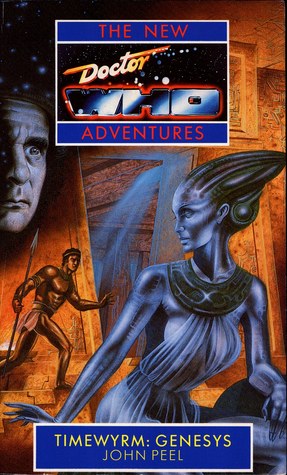Sci-Fi Review: Doctor Who - Timewyrm: Genesys by John Peel (1991, Virgin Publishing)

In 1989, the unthinkable happened. After a twenty-six year run which had garnered countless fans all over the world, Doctor Who aired its final episode. The series, which had suffered a slow decline in ratings several years in a row, was cancelled. The last show of the season, Survival, featured a closing monologue by Sylvester McCoy's Doctor to Sophie Aldred's Ace, reminding her of all the adventures still ahead of them: places to go, things to do, people to see, and tea that was getting cold. "Come on, Ace! We've got work to do."
Those eight words ended an era--it would be seven years before the Doctor returned to the airwaves briefly to regenerate into his 8th incarnation in a made-for-TV movie, and a further nine before Christopher Eccleston's nine met Rose Tyler and the world rejoiced as though at the return of a long-lost love. Doctor Who was back!
But it never really left, did it? Target books continued publishing novelizations of the teleplays after the series was axed, but while it may not have been in the budget to film new adventures, the BBC had no intention of letting such a key franchise go quietly into that good night. They turned to Virgin, who were only to happy to snap up publication rights to further Who escapades, and in June of 1991, John Peel's Timewyrm: Genesys, the first of what would be dubbed "The Virgin New Adventures", arrived on store shelves. So you see, the Terminator franchise wasn't the first to come up with that ridiculous spelling after all.

Timewyrm: Genesys is the first of a four-part series serving to re-introduce the Doctor and Ace, but this wasn't all the company wanted to do. With the essentially unlimited special effects budget available through prose and the restrictions and censorship the property no longer faced on broadcast television, Virgin's mission was to give readers the experience of a darker, more mature Who in keeping with the direction Andrew Cartmel had been taking the series before its cancellation. While this was a good idea in theory, and one the BBC themselves would take once they began publishing their line of Eighth Doctor adventures, the New Adventures are very much products of their time, and it's impossible for me to relate today, in 2017, when Doctor Who is back on the air, just what these 1990 officially unofficial stories represented. I hate the phrase 'you had to be there', but in this case it's appropriate. Without that mindset of these being the only way to experience the Doctor after he'd been torn from the airwaves, these books make for very different reads.
The 'mature' themes are on full display here practically from the get-go. The Doctor and Ace exit the TARDIS into the world of ancient Mesopotamia, the cradle of civilization, where human beings are taking their first steps towards building a civilization. No sooner have they disembarked then they are met by a bare-breasted thirteen-year old (hey, look, boobs--now you see how edgy and mature we are!) who serves as their guide around the city, and just so happens to be in cahoots with the king's fourteen-year old daughter. These two are already plotting against the big bad of the story, so that's convenient! In any case, the TARDIS has taken the Doctor and Ace to this point in history to meet up with Gilgamesh, another king of legend, who goes upon a legendary journey in an effort to save the life of his friend Enkidu.
If you've never read the Epic of Gilgamesh you can still enjoy the story, though as with most historical Who adventures you get more out of it if you're at least familiar with the material they're cribbing. Gilgamesh, in this story, is far from the epic adventurer he's portrayed as in legend...instead he's a rather horny dude who'd rather spend time trying to get into Ace's pants than actually doing anything required of a king. The Doctor has to not only put Gilgamesh on the path which will lead to his Epic being passed on through oral and written tradition, but deal with a cunning adversary whose presence on Earth in this time could foul up the time stream horribly. This adversary is an alien cyborg who's ship crash-landed in the desert. Using her access to superior technology and an understanding of the Mesopotamian religious culture, she's passing herself off as the goddess Ishtar while she plots to take over the planet. It's up to the Doctor, with help from Utnapishtim, another cultural outsider, to steer Gilgamesh on the right path while ensuring the faux goddess gets what's coming to her for impersonating the deity.
Since there are three other parts to come after this one, we can reasonably assume that taking care of Ishtar isn't going to be the one-and-done the Doctor would like it to be, and in fact it turns out the Doctor himself is responsible for turning this already powerful alien into the titular Timewyrm, thereby making his and Ace's lives even more complicated. Whoops...
I'll say this for Peel, he had an unenviable task in penning this first of what would eventually become a sixty-one novel series, and if he'd fouled it up there's no telling what might have happened to Doctor Who in the meantime. He doesn't knock it out of the park, but the 230 pages he delivers do their job satisfactorily. Timewyrm: Genesys, as a story, stands alone as well as any individual story from the 'Key to Time' story arc did during the Tom Baker era, but obviously you'll only get the full effect if you read the next three in the series.
What's done right? Well, Genesys certainly revels in its more mature content. Battle scenes are vicious and brutal, with limbs hacked off, entrails spilled, and skulls caved in with abandon. The priestesses (read: temple whores) of Ishtar wear exceptionally revealing clothing, as noted above. There's also no denying that Peel can nail 'weird', as Ishtar gradually transforms her temple and much of the city into something far exceeding the technology of early Mesopotamian civilization. Scenes where she 'feeds' to renew her energy are downright awful, especially the one early in the book explained tearfully through the words of the temple priestess to the king's daughter.
The primary downside to this book is that Peel's much better at writing action than he is at writing drama. The story starts with a bang, and Ishtar's impersonator is a great villain in her own right, but the middle of the book drags something fierce with lengthy conversations about things characters should not need to tell one another. The main running gag in the book also didn't age well: Gilgamesh basically molests Ace throughout the story as he's attracted to both her looks and attitude, but instead of telling off the roving-handed one, the Doctor gives Ace a sort of "boys will be boys, and this is just how humans behaved back then" talk and leaves her to fend for herself even as she's begging him not to be left alone with the guy. Doctor Who wasn't always as progressive as we thought, unfortunately, and while that sort of gag could fly in 1991, it's excruciatingly tone-deaf twenty-six years later. That said, if you enjoyed the episodes of classic Who most when they were offering up a history lesson, there's plenty of love about Peel's treatment of these legendary times. The sole exception: I know it's fiction, and was addressed early in Eccleston's run, but Peel never explains how the Doctor and Ace can step out of the TARDIS and instantly communicate with people speaking ancient Sumerian. The Doctor's a Time Lord, and a master of so many other skills we might as well give him the ability to understand a long-dead language, but Ace's specialty is in bomb-making, not cuneiform, but her street slang is mostly comprehendable by this vanished civilization.
I know, I know: quit nitpicking and enjoy the story. I really did, I promise, just wanted to throw that out there. :)
Again, you 'had to be there' with this one. Having read it back at the time of its release, I can pop myself back to that period with the proper mindset to experience it as it was, and in that regard it was a serviceable piece of fiction which paved the way for a whole litany of Who stories in book form that continue to this very day. Back then, this was all we had for new Who adventures. It worked, but this was very definitely not your daddy's Doctor. Ironically, almost three decades later, there's a good chance this was your daddy's Doctor depending on how recently you were born. Wibbly-wobbly, timey-wimey stuff indeed!
Oo, the Virgin New Adventures! Exciting. Will you be diving further into the range? The (or so I hear) good stuff - Paul Cornell, Kate Orman, Jim Mortimore and others?
I hear of Peel that he's very much a schoolboy's idea of adult: in-your-face "edginess".
I'd love to, assuming there's interest. I don't own very many of them, alas, and now they're stupid expensive to acquire on the second-hand market, so how far I can go into exploring them is questionable, but I've got a bunch of the Target novelizations to go through, if nothing else... :)
@reported has voted on behalf of @minnowpond.
If you would like to recieve upvotes from minnowponds team on all your posts, simply FOLLOW @minnowpond.
This wonderful post has received a bellyrub 4.72 % upvote from @bellyrub thanks to this cool cat: @modernzorker. My pops @zeartul is one of your top steemit witness, if you like my bellyrubs please go vote for him, if you love what he is doing vote for this comment as well.
@originalworks
The @OriginalWorks bot has determined this post by @modernzorker to be original material and upvoted(2%) it!
To call @OriginalWorks, simply reply to any post with @originalworks or !originalworks in your message!